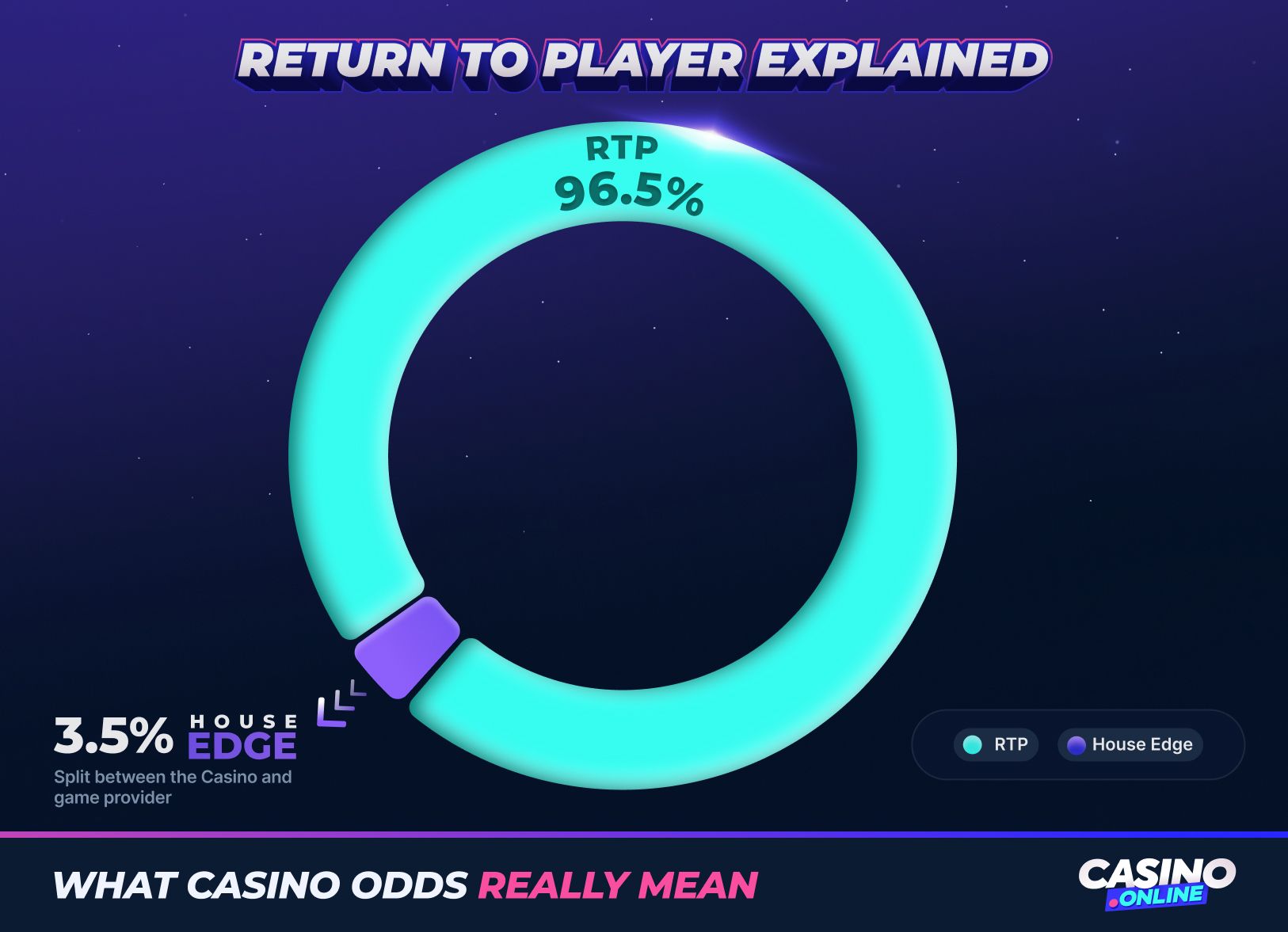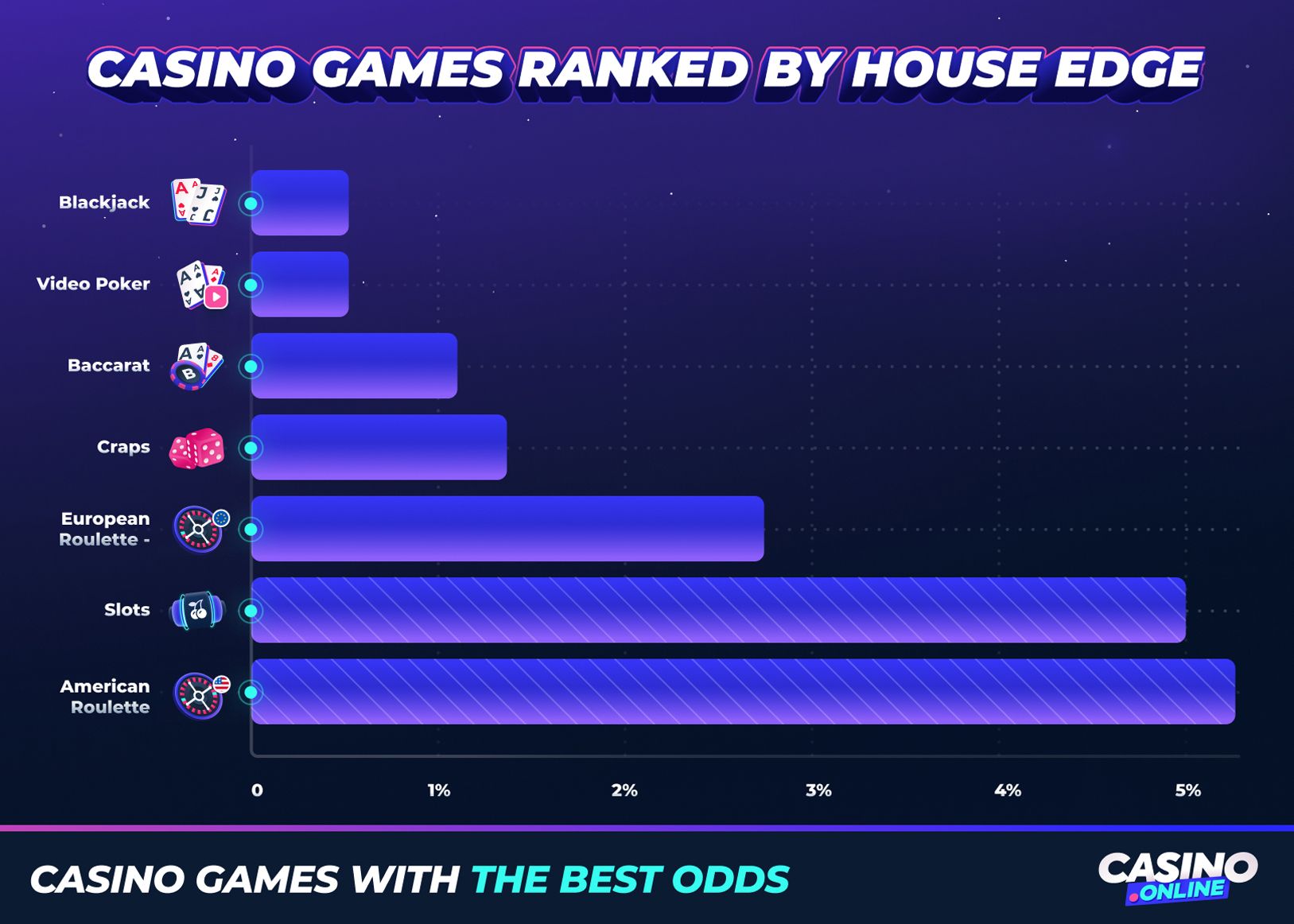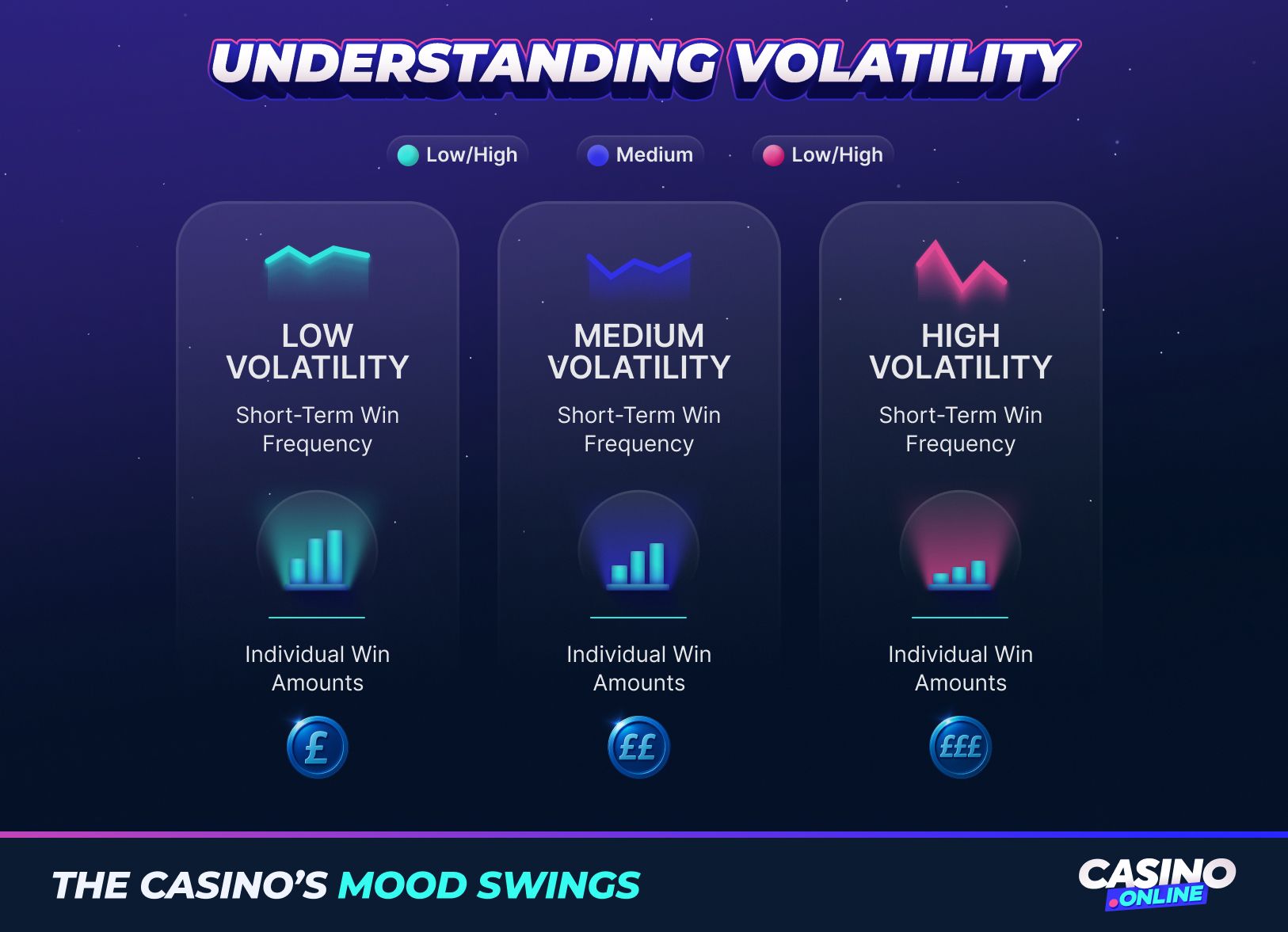
Casino Games with the Best Odds in 2026 Guide to Winning Chances
Article by
Updated by Alejandro Dalby Dec 19, 2025
Perfect for players wanting smart, data-backed tips on online casino games that truly boost your winning chances. Dodge sucker bets, know the numbers, and play smarter to get the most from every chip you wager.
If you're walking onto the casino floor (or logging into your favorite online casino) thinking Lady Luck's about to bless you, here's your wake-up call: without knowing the odds, you're just handing the house your chips. This guide cuts through the fluff with the raw numbers behind the best casino games, where the house advantage varies from skinniest slices to outright gut punches. Whether you're spinning slots, sitting at the blackjack table, or sizing up video poker, knowing what to bet - and what to dodge - is the first step to playing smart.
Top Features Table
What Casino Odds Really Mean: House Edge, RTP & Chance of Winning

Put simply, odds are your chance to win on any bet, while the house edge is the casino's built-in cut. Think of it as a silent partner taking $5 for every $100 wagered. The lower the house edge, the better your odds, and the longer your bankroll lasts without relying too much on Lady Luck.
Return to Player (RTP) is just another way to see the same story, the percentage of wagers a game pays back to players over time. Higher RTP means the casino's cut shrinks, giving you a fighting chance to stretch your chips and stick around longer. Bottom line? Knowing your numbers means you're not just spinning a wheel or flipping a card blindly. You're picking your spots, playing with purpose, and betting like someone who's got skin in the game. And if you play it right? Well, you might just pocket a little extra cash and walk out the door grinning - not just relying on luck, but knowing exactly how to own the odds.
Casino Games with the Best Odds: Game-by-Game Breakdown of House Edge & Winning Chances
.jpg)
Pick your battles wisely. Here's a no-nonsense breakdown of results you can expect when playing the most popular casino games, focusing on house edge and max RTP:
Blackjack house edge & strategy for even money bets and winning
Blackjack's the closest you'll get to beating the dealer while playing a straightforward game. Nail your optimal strategy, especially in single deck games, and the house edge drops to a laser-thin 0.28%. Knowing when to hit, stand, split, or double down is like lining up a perfect dart - precision matters. Side bets? Leave them on the shelf unless you want to feed the house. Pro tip: sharpen up you skills by using a free blackjack simulator before play for real money!
Pass line bet & other line bets explained: How to maximize your craps odds
Craps looks chaotic, but the pass line bet and odds bets are where you get the best bang for your buck, with a house edge as low as 1.41%. Think of it as backing the shooter's win - your chips ride on the come-out roll or the point hitting before a 7.
Avoid "hardways" or proposition bets; those sucker bets have the house edge sky-high, ready to swallow your bankroll.
Baccarat: House edge & how to play smart
The banker bet in baccarat is the king of smart bets with the lowest house edge at around 1.06%. While a 5% commission is charged on banker wins, it's still the best play at the table. Tie bets? Those are infamous sucker bets with some of the casino's worst odds. Back the banker, avoid the tie, and rely on a game that plays itself - just like the dealer's hand.
European Roulette vs American Roulette: Why the single zero makes all the difference
European and French roulette are your friends thanks to single zeros on their wheels. The house edge nearly doubles on the American roulette wheel with its extra double zero. When the ball lands on zero or double zero, the house collects its cut, so fewer zeros mean better chances your chips stick around longer. Skip American roulette unless you enjoy watching your bankroll disappear.
Slots with best RTP & what to avoid
Slots are the casino's siren song - flashy, fun, and wildly volatile. However, the house edge varies massively depending on RTP and machine volatility. Slots with RTP north of 98%, like NetEnt's Mega Joker, give you the best shot, but many 'fun' slots come with house edges upwards of 10%. Remember: play slots for entertainment; don't expect miracles.
Video Poker: How skill influences RTP and your chance of winning
Video poker is close to a skill game and can offer some of the best odds if you master the pay tables and strategy charts. Games like Jacks or Better, played perfectly, can have RTPs hitting nearly 99.5%. Unlike slots, your card decisions impact the house edge and give you a real fighting chance.
Casino Games with the Worst Odds: What to Avoid if You Want to Win
Head straight away from the games with the worst returns - American roulette, slots with low RTP, and high-risk proposition bets. Those flashy jackpots? They're a sucker's bait. Sucker bets like tie bets or hardways chew through your bankroll faster than a darts player missing the bullseye.
Understanding Volatility: The Casino's Mood Swings
.jpg)
Volatility is the wild card of casino games - it's how crazy the ride's gonna be. Slots are the high-octane rollercoasters, promising massive jackpots but ready to throw you overboard with brutal losing streaks. Meanwhile, baccarat and blackjack deal smaller, steadier wins, the kind of poker-faced returns that keep your bankroll afloat. Think of volatility like the tides when you're fishing - know your bankroll and match your game choice to the mood swings you're willing to endure.
Pro Tips to Tilt the Odds (Even Slightly) in Your Favor
- Master optimal blackjack and video poker strategies to chip away at the house edge.
- Skip side and proposition bets, the casino's secret weapons.
- Lean on smart bets like baccarat banker and craps pass line.
- Avoid American roulette; your chips will thank you.
- Practice bankroll discipline - chasing losses is how you lose for sure.
Before You Go: A Few Hard Truths
The house always has its secret weapon - a built-in edge that slowly chips away at your stack over time. It's not about beating you in one hand, but about the long game where the math's steady and the house keeps winning.
Your best bet? Know the odds, pick the right games, and stick to smart wagers like blackjack and baccarat. That way, you stretch your chips, keep losses in check, and actually enjoy the game. And remember, sometimes the smartest move isn't to double down or chase a streak - it's to pocket what's left and walk away before Lady Luck decides it's her turn.
FAQ - Casino Games with Best Odds
Which casino games have the best odds?
If the goal is to stretch that bankroll and play smart, blackjack tops the list - especially when you're nailing the basic strategy. Craps comes close, but only if you stick to the pass line bets. Baccarat is another strong contender, and don't forget European roulette with its single zero, which gives you better odds than the American double-zero wheel. Lastly, video poker rewards skillful play better than most slots. These are the games where the house edge stays under 2%, giving you a fighting chance to take home something.
What are even money bets in casino games?
Think of even money bets as the steady-every-time wagers - you win what you bet. Common examples include the banker bet in baccarat or player bets in blackjack. They offer almost a 50/50 chance and generally lower house edges, meaning less bite for your bucks.
How does the pass line bet work in craps?
The pass line bet is craps 101, the bedrock wager you make before the come-out roll. You're betting that the shooter will roll a 7 or 11 right out of the gate, and you win immediately. But if the dice show 2, 3, or 12 (aka craps), you lose. Any other number becomes the "point," and now the game's on: the shooter needs to hit that point number again before rolling a 7 for you to win. If a 7 comes first, you lose. It's a simple bet, pays even money, and carries a nice low house edge around 1.41%, making it a favorite for newbie and seasoned players alike.
Why is European roulette better than American roulette for odds?
European roulette keeps it simple with just one zero on the wheel, which cuts the house edge nearly in half compared to American roulette's double zero. That extra zero isn't just a number - it's extra money the casino pockets more often, so if you want to give yourself a better shot, always go European. It's the difference between a fair shot and a fast track to losing your bankroll.
Which casino games have the worst odds?
You want to steer clear of American roulette, low-RTP slot machines, and all those tempting side bets with sky-high house edges. These are the real money traps masquerading as fun - quick to drain your chips faster than you can blink. If you want to last at the table, remember: bigger potential jackpots often come with much bigger odds against you.
What is the house edge in blackjack and how does it affect my chances?
Blackjack's got one of the best house edges around - usually runs between half a percent to maybe 2%. Course that depends on the rules and whether you actually know what you're doing. Play your cards right - know when to split those eights, double on an eleven - and you keep the house edge tight. Start playing hunches or chasing side bets, and watch the casino's advantage balloon back up.
Can video poker offer better winning chances than slots?
Yes. With perfect play, video poker can push RTP close to 99.5%, giving you better odds than most slots. Unlike slots, your decisions in video poker really matter.
What is my actual chance of winning any casino game?
Depends what you're playing and how you play it. Each game's got its own odds, each bet type changes things up. Here's what matters though - understanding house edges, knowing which bets are smart, using proper strategy. Do that and you're not just gambling, you're managing your money better and giving yourself real shots to come out ahead.

Written by
Andrew Collins
Author
I've spent over nine years at five leading iGaming firms - and long before that, I was emptying slots and balancing takings since 1992. From diving deep into slots and unearthing hidden betting strategies, I deliver witty, actionable advice that even seasoned bettors appreciate. Ready to elevate your play with me and casino.online? Let's get started!

Facts checked by
Alejandro Dalby
Content Writer & iGaming Specialist
I'm an experienced writer specializing in casino games. My journey in the iGaming industry has equipped me with a deep understanding of gaming strategies and market trends. I'm here to share my insights and help you navigate the exciting world of online gambling.



